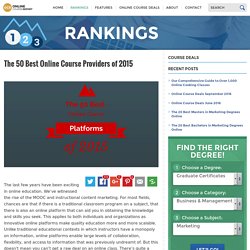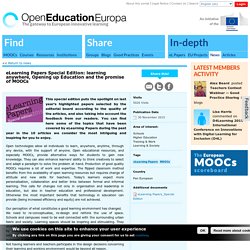

The Top 50 Online Course Providers of 2015. The last few years have been exciting in online education.

We’ve witnessed the rise of the MOOC and instructional content marketing. For most fields, chances are that if there is a traditional classroom program on a subject, that there is also an online platform that can aid you in obtaining the knowledge and skills you seek. This applies to both individuals and organizations as innovative online platforms make quality education more and more scalable. Unlike traditional educational contexts in which instructors have a monopoly on information, online platforms enable large levels of collaboration, flexibility, and access to information that was previously undreamt of.
But this doesn’t mean you can’t get a raw deal on an online class. For this reason, Online Course Report has surveyed over 350 online course providers to seek out the extent to which they provide for the best online instructional strategies, as well as the extent of their offerings. 1. 2. 3. 4. 5. 6. 7. 9. 10. 11. 14. eLearning Papers Special Edition: learning anywhere, Opening up Education and the promise of MOOCs. Open technologies allow all individuals to learn, anywhere, anytime, through any device, with the support of anyone.

Open educational resources, and especially MOOCs, provide alternative ways for students to gain new knowledge. They can also enhance learners’ ability to think creatively to select and adapt a paradigm to solve the problem at hand. Production of good quality MOOCs requires a lot of work and expertise. The flipped classroom method benefits from the availability of open learning resources but requires change of attitude and new skills for teachers.
Today’s learners expect more personalisation, collaboration and better links between formal and informal learning. Our perception of what constitutes a good learning environment has changed. MOOCs – question on purpose, quality, student retention, feedback, etc. Ahh, questions around the purpose, quality, value, etc. in and around MOOCs have started again, and justly so.

Disclaimer: Like many I have opinions, but not answers. The recently raised questions, started by Fred Riley on the ALT mailing list, have produced a good set of resources for those of us who are starting to ask these questions, needing a more comprehensive or value-added answer. Fred’s original query was: Does anyone on this list know of any recent research and/or articles on the teaching quality of MOOCs? I’m thinking of things such as: student retention, with MOOC drop-out rates being notoriously high (I plead guilty to that myself :( )student surveys and qualitative feedbackhow many students in a MOOC platform (eg FutureLearn) go on to take further courses in that platform I’m sure that there are many other indicators of quality – those are just off the top of my head.
Here are some of the resources shared, in response to Fred’s original query: Highbrow – personal knowledge hacking tool. Free Education Sites & Online Learning Courses & Providers. Making Online Learning and Teaching Easier and Affordable. Coursera - Free Online Courses From Top Universities. Learning. Accredited Online Universities: Compare 2015's Best Schools. Reference/Education/Distance Learning/Online Courses/E-learning Portals.